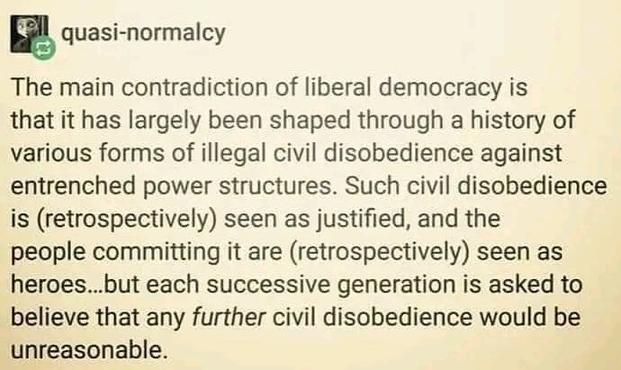@firefoxx66 Closely correlated is the belief that Democracy is done evolving.
Clearly a system where everyone have to delegate their part of the power to a different person, possibly with very few such delegates that one can realistically choose from, under the threat that if your choice isn't popular enough your vote will simply be ignored, and where those delegates are free to just ignore everything they promised in order to get your vote in the first place, is the best one can imagine!
@davevolek has some interesting ideas on how to build a bottom-up democratic government (Tiered Democratic Governance). I think it's a pretty solid idea.
There's also a lot of work that has been put into alternative methods of voting similar to what you mention, ranging from ranked-choice voting all the way back to sortition (as practiced in ancient Athens).
Defining requirements is more about the end goals than the engineering techniques used to meet them. What do we want our system to accomplish? Currently, we have a system that produces a tyranny of the majority. There are ways to make democracy even more inclusive. The term I use for these, collectively, is proportional representation. This is when the system grants power to the constituents in proportion to their numbers, rather than having a strict cutoff when plurality or majority is reached.
@hosford42 @NohatCoder @firefoxx66
Most European countries have PR elections and legislatures. But they still have their issues related to the 12 limitations.
The TDG is not another version of western democracy. It has no political parties.
When Europe moved from fuedalism to democracy, this was a big jump for the better. When a nation moves from western democracy to the TDG, it will be just as big of a jump.
@NohatCoder @hosford42 @firefoxx66
"Soviet democracy" is a misnomer. The soviet elections were rigged to support the Politburo.
TDG elections will be more organic.
@davevolek It would be way more convincing to explain what sets it apart, specifically, and not just say it will be different.
@hosford42 @NohatCoder @firefoxx66
Communists had one party. The TDG has no parties.
Communists had an ideology. The TDG has open minds.
Communists engaged in power struggles. The TDG elections have people move in, out, up, down, and around.
Maybe 5% of the citizens were allowed to vote in the communist election. Everyone can vote in TDG elections.
@NohatCoder @davevolek @firefoxx66
"In post-revolutionary Russia local workers' soviets would elect representatives that go on to form regional soviets, which in turn elect representatives that form higher soviets, and so on up to the Congress of Soviets."
@hosford42 @NohatCoder @firefoxx66
Everyone gets to vote in the TDG.
But instead of voting on charisma, issues, or self interest, the TDG teaches voters to look more at "good character" and "capacity for governance."
It will take some time to build that culture. Maybe five years.
@davevolek What are your thoughts on the stability question? If the system is, in actuality, more prone to power accumulation at the higher levels, how can this be countered? Fewer tiers? Some other mechanism?
What are your thoughts on a tiered direct democracy? I.e. a location-based hierarchical organization still exists, but people have direct involvement at every level rather than electing representatives. So, for example, all people in a city would vote directly on city questions, and likewise for state and nation, preserving the locality of governance.
@hosford42 @NohatCoder @firefoxx66
The TDG must cast aside power accumulation if it is to work. But this is easier said than done. So the TDG needs to be built outside the current system that is full of power accumulators.
The power accumulators will not be insterested in the early TDG. So the TDG can build the good culture without the bad culture in the picture.
When the TDG becomes better known, anyone with power accumulation tendencies will not be voted for.
@hosford42 @NohatCoder @firefoxx66
Sorry, I just noticed your two questions.
I'm not sure what the "stability question" is about. So, I shall refrain from commenting.
About 30 years, I did some study with direct democracy--and concluded it would not be a good way for future governance. Sorry, most of us won't spend the time to analyze all the issues to cast a wise collective vote, like whether our sanitation department is running well or not.

